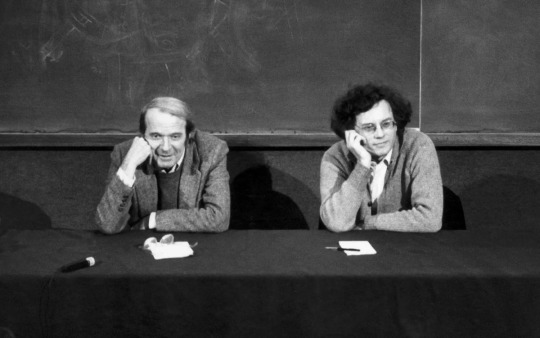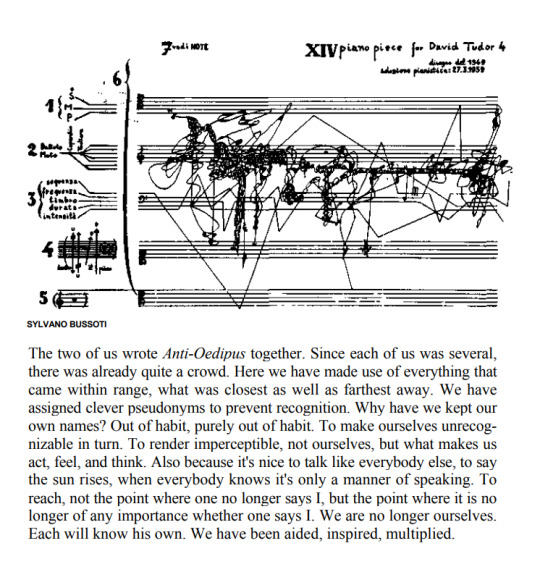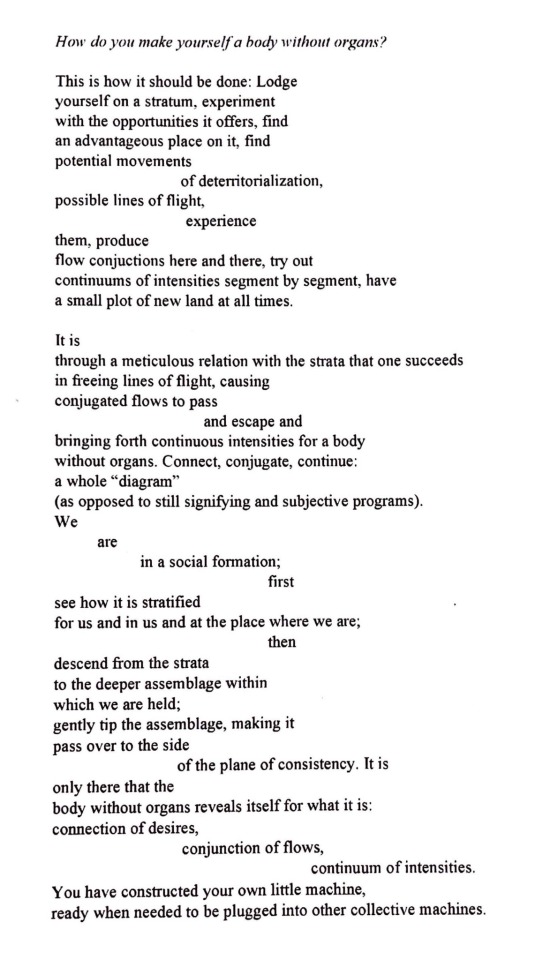#deleuze & guattari
Text
O kapitalizmu i shizofreniji u Deleuzeovim i Guattarijevim djelima Anti-Edip i Tisuću platoa
Deleuze i Guattari
Piše: Žarko Paić
Zašto podnaslov prvog i drugoga sveska Deleuzeva i Guattarijeva djela Anti-Edip i Tisuću platoa glasi kapitalizam i shizofrenija, a ne kapitalizam kao shizofrenija? Moj je odgovor ‘lud’. Zato što imaju u vidu kapitalizam kao mehanosferu, a to je još uvijek realizirana metafizika kojom vladaju samo rastemeljeni koncepti metafizike. Sve već imamo objašnjeno u…

View On WordPress
1 note
·
View note
Text
A true politics of psychiatry, or anti-psychiatry, would consist therefore in the following praxis: (1) undoing all the reterritorializations that transform madness into mental illness; (2) liberating the schizoid movement of deterritorialization in all the flows, in such a way that this characteristic can no longer qualify a particular residue as a flow of madness, but affects just as well the flows of labor and desire, of production, knowledge, and creation in their most profound tendency. Here, madness would no longer exist as madness, not because it would have been transformed into "mental illness," but on the contrary because it would receive the support of all the other flows, including science and art—once it is said that madness is called madness and appears as such only because it is deprived of this support, and finds itself reduced to testifying all alone for deterritorialization as a universal process. It is merely its unwarranted privilege, a privilege beyond its capacities, that renders it mad. In this perspective Foucault announced an age when madness would disappear, not because it would be lodged within the controlled space of mental illness ("great tepid aquariums"), but on the contrary because the exterior limit designated by madness would be overcome by means of other flows escaping control on all sides, and carrying us along.
– Gilles Deleuze and Félix Guattari, Anti-Oedipus: Capitalism and Schizophrenia
Perhaps one day one will no longer know clearly what madness really was...Artaud will belong to the ground of our language, and not to its rupture...Everything that we experience today in the mode of the limit, or of strangeness, or of the unbearable, will have joined again with the serenity of the positive. And what for us currently designates this Exterior stands a chance, one day, of designating us.
– Michel Foucault, History of Madness
#a world created in the process of its tendency#je est un autre#gilles deleuze#félix guattari#michel foucault#anti-oedipus
149 notes
·
View notes
Text

#sigma male#male satire#gay#gaycel#androphilia#anti oedipus#gilles deleuze#felix guattari#mlm#tasty#testosterone#guy hocquenghem#homosexual desire#hot men reading
46 notes
·
View notes
Text

"A Thousand Plateaus" (1980), Gilles Deleuze & Felix Guattari
408 notes
·
View notes
Text
"… the major enemy, the strategic adversary is fascism. And not only historical fascism, the fascism of Hitler and Mussolini—which was able to mobilize and use the desire of the masses so effectively—but also the fascism in us all, in our heads and in our everyday behaviour, the fascism that causes us to love power, to desire the very thing that dominates and exploits us."
Michel Foucault, Preface to “Anti-Oedipus: Capitalism and Schizophrenia”, by Gilles Deleuze & Felix Guattari
128 notes
·
View notes
Text

Deleuze & Guattari
68 notes
·
View notes
Text
What makes fascism dangerous is its molecular or micropolitical power, for it is a mass movement: a cancerous body rather than a totalitarian organism. American film has often depicted these molecular focal points; band, gang, sect, family, town, neighborhood, vehicle fascisms spare no one. Only microfascism provides an answer to the global question: Why does desire desire its own repression, how can it desire its own repression? The masses certainly do not passively submit to power; nor do they "want" to be repressed, in a kind of masochistic hysteria; nor are they tricked by an ideological lure. Desire is never separable from complex assemblages that necessarily tie into molecular levels, from microformations already shaping postures, attitudes, perceptions, expectations, semiotic systems, etc. Desire is never an undifferentiated instinctual energy, but itself results from a highly developed, engineered setup rich in interactions: a whole supple segmentarity that processes molecular energies and potentially gives desire a fascist determination. Leftist organizations will not be the last to secrete microfascisms. It's too easy to be antifascist on the molar level, and not even see the fascist inside you, the fascist you yourself sustain and nourish and cherish with molecules both personal and collective.
"1933: Micropolitics and Segmentarity", Gilles Deleuze and Félix Guattari, A Thousand Plateaus
46 notes
·
View notes
Text
"That is why the fundamental problem of political philosophy is still precisely the one that Spinoza saw so clearly, and that Wilhelm Reich rediscovered: "Why do men fight for their servitude as stubbornly as though it were their salvation?" How can people possibly reach the point of shouting: "More taxes! Less bread!"? As Reich remarks, the astonishing thing is not that some people steal or that others occasionally go out on strike, but rather that all those who are starving do not steal as a regular practice, and all those who are exploited are not continually out on strike: after centuries of exploitation, why do people still tolerate being humiliated and enslaved, to such a point, indeed, that they actually want humiliation and slavery not only for others but for themselves? Reich is at his profoundest as a thinker when he refuses to accept ignorance or illusion on the part of the masses as an explanation of fascism, and demands an explanation that will take their desires into account, an explanation formulated in terms of desire: no, the masses were not innocent dupes; at a certain point, under a certain set of conditions, they wanted fascism, and it is this perversion of the desire of the masses that needs to be accounted for."
Gilles Deleuze and Felix Guattari, Anti Oedipus: Capitalism and Schizophrenia (Page 29)
73 notes
·
View notes
Text

girl,,,
34 notes
·
View notes
Text
Deltarune, or how do you become a Body without Organs?
After a year of struggling with it, the video is FINALLY out!
#deltarune#deltarune analysis#deltarune theory#deltarune video#utdr#philosophy#deleuze#guattari#body without organs#d&g
71 notes
·
View notes
Photo

Gilles Deleuze and Félix Guattari, Anti-Oedipus
494 notes
·
View notes
Text
Le paranoïaque machine des masses, et ne cesse de former de grands ensembles, d'inventer des appareils lourds pour l'encadrement et la répression des machines désirantes. Certes, il ne lui est pas difficile de passer pour raisonnable, en invoquant des buts et des intérêts collectifs […]
(Gilles Deleuze, Félix Guattari, L'Anti-Œdipe)
17 notes
·
View notes
Text
Desire knows nothing of exchange, it knows only theft and gift.
– Gilles Deleuze and Félix Guattari, Anti-Oedipus: Capitalism and Schizophrenia
124 notes
·
View notes
Text

Gillez Deleuze, Félix Guattari
16 notes
·
View notes
Text
Okay so my first post is going to be about the link between capitalism and existential angst, which is the most on brand thing possible for me, so if you like this there’ll be much more of it and if not… sorry. 😅
I’ve always had a proclivity for angsty existentialism. Multiple times a housemate has found me sprawled on a sofa moping about the meaning of life which sounds really pretentious but idk I feel like on some level that’s just being a student. And it’s that material side of it that’s got me curious recently like - were these anxieties just a result of the kind of individualistic, listless existence a student inhabits? There’s probably a reason the stereotypes of angst are people with enough wealth to avoid work but not enough respect or expectations to have a solid idea about what they should be doing: Percy Shelley, Lord Byron, Søren Kierkegaard, etc.
In the first volume of his Critique of Everyday Life, Henri Lefebvre calls out Kierkegaard specifically as a prime example of bourgeoise alienation, the result of which was literally creating existentialist philosophy - the idea that we have to create meaning for ourselves by force of will and taking a leap of faith. Lefebvre claims that existential angst is always a result of some sort of alienation. When Marx formulated alienation as the psychological suffering we experience when we are separation from ourselves, each other, the products of our labour, and nature, he was thinking about the way the working class are made to suffer under capitalism, but Lefebvre expands the theory beyond this. He describes how alienation is always relative and present in all types of society for all people within it. Alienation is not just a result of individualism and exploitation - it also presents itself when we feel too far from someone we love, and when we are mystified by the natural world. Crucially, we are alienated when we become detached from the fact that we are dependent on others for our survival, something common to all the bourgeoisie.
Acknowledging this dependency would make us aware of the injustice of how these responsibilities are distributed (according to class, gender, race, etc.), and getting past the separation would require a radical change in lifestyle involving the rejection of the serving of the individual self so integral to bourgeoise morality. It’s hard! But with the lines between proletariat and bourgeoisie becoming more and more blurred with the expansion of the middle class, recognising this particularly bourgeoise suffering is important, I think, if we want to articulate a reason more people can get behind to resist capitalism.
People suffer when they’re separated from people, when their material existence feels so isolated and insignificant that they have to rely on spirituality to give them any sense of grounding, but are unable to be confident in their beliefs so can only ever relate to religion through anxiety (both my best friends speak of religion in this way, and before I read Lefebvre I was tempted to join them because it sounded better than the nihilism I was struggling with). Seriously, read any Kierkegaard and you will know he was not a happy guy. He wrote book called The Concept of Anxiety, and Fear and Trembling for God’s sake. He’s not okay! 🥺 But poor Søren might have been okay if he’d been a bit less self obsessed, acknowledged the value of *inter*subjectivity rather than pure responsibility, and actually married his fianceé rather than worrying about his independent morality, which was really just arrogance. I sound mean but I love him really. He’s very entertaining and *painfully* relatable.
But this is why I find Simone de Beauvoir to be the absolute best of the existentialist canon, because she recognises the need for recognition and connection, even for the powerful. In The Ethics of Ambiguity, she writes about how even tyrants suffer in hierarchical societies because they can never know authentic respect, since people always see their power and the threat implicit in it rather than their whole humanity. This doesn’t mean that we should never violently resist tyranny, because individualism is hard to overcome, even when it’s self-sabotaging, but awareness of this could get more people on the side of equality. This idea is apparently supported empirically in The Spirit Level, by Richard Wilkinson and Kate Pickett, but I haven’t read that one yet. I like to put it in Spinozist terms: the satisfaction of one desire can be excessive when it blinds us to our other needs and presents us from feeling other forms of joy.
On how it can be overcome though, I think Judith Butler offers an interesting frame for thinking about it. Though they’re best known for their work on the social construction of gender, my favourite book of theirs is Giving An Account of Oneself, where they write about how our mental life is a product of all our previous experiences, especially with other people. This seems obvious on some level, but it really undermines individualism. In particular, it deconstructs the distinction between attacking parts of yourself and attacking other people. If our internal and external lives are so interlinked, is it really surprising if attacking ourselves isolates us? Recognising that other people are in some sense present within us is conducive to greater intimacy, and though this can be uncomfortable if we dislike part of them, that doesn’t make it less true, and recognising this can make us more compassionate with everything within us. Self-hatred and hatred of others are intimately connected, and they reinforce each other.
I like to think of the relationship between different parts of myself in terms of Deleuze and Guattari’s machinic unconscious, where our minds are made up of interlocking parts from the larger social context. I think differ though in wanting to negotiate and find equilibrium between them rather than experimenting by letting certain parts go to extremes to make change though. I like the way Jacques Derrida writes about it in The Politics of Friendship, where to recognise the other in oneself, and so recognise the misalignment within ourselves, requires us to be a friend to oneself, which makes friendship so central that it undercuts any potential narcissism because by loving oneself as an other we learn to love others better (as well ourselves).
This doesn’t address the concrete politics of the situation though. The aspect missing is that we have to think of ourselves as inextricably linked to our social and political systems, part of a historical process, and our feelings about those systems are a very real part of that process, and if we want to be true to ourselves we have to act on those feelings rather than repress them. I’m still working out what that means for myself, and as Lefebvre notes it’s this final hurdle that most people fail at, but we can all try.
That kind of went all over the place, but hopefully it’s understandable and valuable, and if not it was helpful for me to articulate all these ideas that have been swirling around in my head for the past year or so. 😅
#existential angst#existentialism#marx#karl marx#henri lefebvre#simone de beauvoir#judith butler#soren kierkegaard#alienation#interdependence#individualism#deleuze and guattari#gilles deleuze#derrida#jacques derrida#deleuze#capitalism#bourgeoisie#communism#anarchism#spinoza#psychoanalysis#politics#social theory#sociology#philosophy
33 notes
·
View notes
Text

today in the library i turned a deleuze and guattari paragraph into a poem
#a thousand plateaus#deleuze#guattari#deleuze and guattari#deleuze & guattari#body without organs#bwo#philosophy#poetry#d&g#capitalism and schizophrenia
13 notes
·
View notes